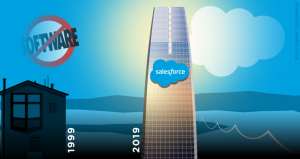It was a cold February morning in 2000 when staff began arriving at San Francisco’s Regency theater. Their job that day was to recreate the seventh circle of hell for Salesforce, a Silicon Valley startup marketing their first software-as-a-service (SaaS) product.
Marc Benioff, Salesforce’s co-founder and CEO, wanted his company to stand out from the crowd and he did just that by turning the theater’s lower level into a Dante’s Inferno-like hell where tortured souls railed against the need for expensive enterprise software. Over 1,500 attendees roamed through scenes depicting anguished enterprise software salespeople locked up in cages and pleading with passersby to set them free and to “sign this million-dollar license agreement. I need to make my quota!”
After wending their way through the ugly realities of the underworld, the guests emerged into an oasis where soft-lighting, music and Salesforce.com showed them their struggles were over. No need for expensive up-front costs, time-consuming software installations and massive system updates and maintenance when Salesforce’s SaaS could offer the heavenly light of simplicity and scalability.
PR Week recognized Salesforce’s ‘End of Software’ campaign as the ‘Hi-Tech Campaign of the Year’. Within two weeks of the launch party, the company had received approximately a thousand new sign-ups for their service. “The End of Software mission and the ‘No Software’ logo effectively conveyed how we were different,” Benioff said of his company’s early days campaign.
Salesforce was originally founded in 1999 by Oracle executive Marc Benioff, Parker Harris, David Moellenhoff and Frank Dominguez Jr. While Benioff became the beloved front guy for Salesforce.com, Harris, Moellenhoff and Dominguez worked behind the scenes to build the customer relationship management (CRM) platform for people who didn’t realize they needed the cloud-based software until they saw it. Despite pressure from venture capital investors, the founders made a promise that they would only offer their products as an online service.
It turns out that the co-founders’ choice to offer only cloud-based options was the right one. Twenty years later and the company is doing better than ever. Wall Street credits Benioff’s innovative marketing ideas for bringing Salesforce to the masses and they are now a strong industry leader in their sector. Their stock price has gone up more than 35 percent in the last year and revenues from the CRM market are expected to reach $80 billion by 2025. Growth across all geographic markets, products and sales segments for 2018’s fourth quarter revenue came in at $3.6 billion.
“I don’t think the company’s ever been stronger or been in a better position, and the reason why is every company that we’re dealing with is going through a huge digital transformation and every digital transformation begins and ends with the customer,” Benioff told Jim Cramer in an exclusive interview with Mad Money.
Their flagship product is their CRM software that, in essence, connects companies with their clients. One example is how the platform enables a business’ support staff and sales teams to access all the customer’s information so the right mix or services and software can be offered at the right time. Their full complement of products can be broken down into several categories, including Commerce Cloud, Sales Cloud, Service Cloud, Data Cloud, Marketing Cloud, Community Cloud, Analytics Cloud, App Cloud and IoT.
























